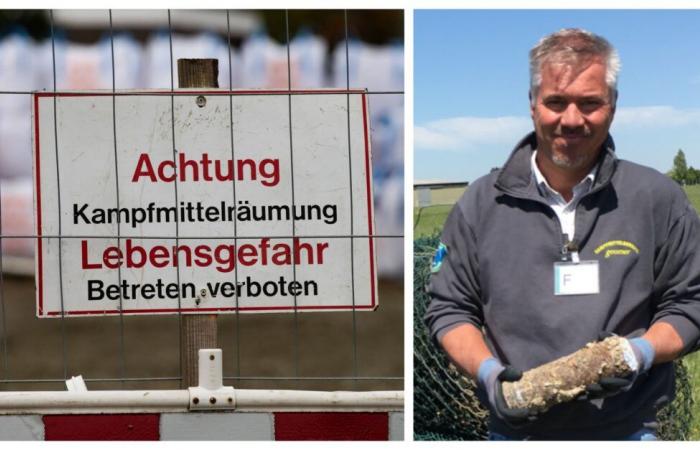The geographer Jürgen Kuhrdt is a state-certified fireworker. As a native of Ulm, he knows the region well. He founded the Geomer company in Augsburg 35 years ago and specialized in explosive ordnance disposal. In the interview he talks about his work, the dangers of combat ammunition and the right reaction if you do find a bomb in the garden.
Are there estimates as to how many bombs are still lying underground in Ulm?
Nobody can know that, at most they can only speculate. Well over 100,000 tons of dropped ammunition are still distributed in Germany. Ulm has even experienced major attacks and countless smaller attacks. Of course there is still ammunition lying around. Estimates suggest that ten to 15 percent of the bombs were unexploded bombs. But no one knows how many there are in Ulm.
Do you think that the danger of unexploded ordnance in the ground is underestimated today? That sounds like a false sense of security.
There is of course an increased risk. You can find unexploded bombs at any time. There are also self-timers that trigger for no apparent reason. There is a danger in many cities, it just has to be said. But I wouldn't overestimate this danger either. You have no way of knowing whether you drive past the bomb every day on your way to work or not. Anyone who is afraid of this is not allowed to travel anywhere here in Germany.
Nevertheless, the danger is likely to be significantly greater in urban areas than in rural areas?
Yes, bombs are expensive. Agricultural areas were therefore generally not bombed. It mainly hit the cities to demoralize the population, but also to hit the industry. However, the bombardiers' accuracy was very poor in the first years of the war. It was not uncommon for the wrong cities to be bombed. Therefore, the bombs of numerous air raids fell far away from the actual target, so that agricultural areas and even forests were also bombed.
How does it feel when you stand in front of a bomb like that and know that you have to defuse it now?
When we find a bomb, we know we've done everything right. The explosive ordnance disposal service also knows exactly what it is doing. You need peace and quiet. First of all, you have to know exactly what type of bomb you have in front of you. I have stood next to many live bombs myself. If they don't move, nothing usually happens. At least not with the impact detonators commonly used. But defusing is always a delicate process. Nobody knows what condition the firing mechanism will be in after about 80 years.
But defusing is always a delicate process. Nobody knows what condition the firing mechanism will be in after about 80 years.
Jürgen Kuhrdt
If here in Germany you are clearing away the ammunition from the two major wars and at the same time you have to watch new bombs being dropped around the world every day and people dying, then it is more than just frustrating.
How does defusing a bomb actually work?
With standard-ignited bombs, people are now increasingly switching to remote defusing. For example, a rocket screw is screwed onto the detonator. There are 2 2 cm cartridges in it. These are ignited and then it spins the igniter out of the igniter socket at incredibly high speed, sending the whole device flying outside. Disarming used to be a lot more complicated; the detonator was often unscrewed with a water pipe wrench.
Recommended articles
How great is the destructive potential of the bombs that are mostly found on construction sites these days?
That's difficult to say. There are countless different types of bombs.
The bomb in Ulm weighed around 250 kilograms and was evacuated within a radius of 300 meters. In your opinion, was it the right decision?
I don't want to say anything about that. The KMBD knows exactly what it is doing. It is simply impossible to make a reasonable statement. The potential for destruction always depends on how far the pressure wave can spread and which buildings are located around the site. One thing is certain: no one wants to stand close. A detonation is terrible, infinitely loud and the pressure wave is enormous.
Have you ever had a defusing go wrong?
No, fortunately not me yet. But in 2010, for example, three people died during a defusing operation in Göttingen. We know that bombs are always dangerous. But when it comes to defusing, full professionals are at work and it usually turns out well. If a particularly dangerous long-term detonator bomb is discovered, it may have to be detonated on site if necessary. That happened once in Munich. The cone of fire could be seen from a very long distance. This is not a nice experience.
We mostly talk about bombs, but there is a lot more ammunition in the ground…
Yes. naturally. We also find an incredible number of grenades, sometimes mines and hand grenades. We often still find ammunition from the First World War.
What happens to the bombs that have been defused?
After the detonators have been removed, the bomb is taken to the dismantling plant and then usually cut up with a large hacksaw and dismantled into its individual parts. Smaller ammunition is often burned in an oven or exploded in a controlled manner. I don't want to say exactly where this happens. That's nobody's business.
Theoretically, you can even find bombs or leftover ammunition in your own garden. How big is the danger and how should you react in an emergency?
Of course, there could still be unexploded bombs in private gardens in bombed areas, but no one knows. Time and again, for example, stick incendiary bombs that were dropped in large quantities can be found in the topsoil. They look like a huge, hexagonal matchstick with an aluminum-colored jacket, some have a still recognizable red head. If you find unexploded bombs or have a suspicion, the following always applies: stay away, call the police immediately and they will then alert the bomb squad. Never touch ammunition, do not move anything and do not attempt to transport the material away. Or even bring it to the police on your own initiative.







